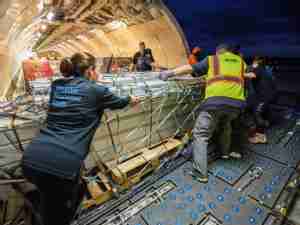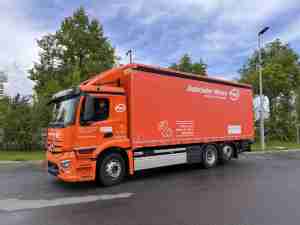By Leo Quigley, AJOT
For people who work to facilitate the movement of goods worldwide it's been an interesting year.
A shortage of ships, congested ports, a lack of railway equipment and a flurry of new security regulations are a few of the things that have kept freight forwarders awake at night. Members of the Canadian International Freight Forwarders Association (CIFFA) have shared in that sleeplessness.
George Kuhn, Executive Director of CIFFA, told AJOT that members of the Canadian association have had a difficult year working in an environment where security regulations have been much less clear than they have been South of the border.
He said part of the reason for this is the fact that Canada has two separate departments for transport and revenue.
"On one side you have Transport Canada that is basically responsible for the safety of the vehicles used for transport," he said. "When it come to security per se, in terms of how you control what's coming in and what's going out, that is Canada Customs.
"When I say there is a dichotomy between one and the other, there are certain strict requirements in regards to reporting on the movement of goods. Transport Canada has not yet been able to wrap its head around what kind of security requirements there should be over and above that. So, what they have decided on is a so-called 'awareness' program where we have participated in poster printings such as, 'be suspicious of anything unusual,' etcetera.
"But that's it. It (Transport Canada) doesn't even have a system yet for setting out how you should report such things. It hasn't established security arrangements. For the intermediaries, for example the customs brokers, it hasn't established anything yet to be observed by the carriers."
Kuhn says these types of situations have led to confusion as to what CIFFA members should do.
This, even though following 9/11, CIFFA published security guidelines for its members.
Unfortunately, Kuhn said the association was advised by legal council that it should be very careful in the phrasing of its guidelines, or it could be held liable since the government had not yet published its regulations.
"Somebody needs to sit down and draw up some clear-cut parameters for everybody in the supply chain, so they know what kind of security requirements they have to meet to be a certifiable company when it comes to security issues," he said.
Kuhn said CIFFA has offered its guidelines to Transport Canada as a template for security legislation, but Ottawa does not appear to have a timeline for the release of Canada's security guidelines.
In the meantime, he said, CIFFA's membership is operating with the guidelines that have been issued by the association ' guidelines that have been watered down because of a legal concern about liability.
The other challenge that is now facing the 57 year-old organization, Kuhn said, is the emergence of China as a major exporter, and the difficulty Canada's West Coast is experiencing handling burgeoning traffic levels.
Kuhn said CIFFA members are often caught between the contractual requirements faced by a customer and the challenges faced by shippers moving goods.
"Our members are very often engaged in finding alternative (forms of transport). On a short time basis this is usually the use of a truck to hook onto that container and drive through to the East," he said.
"That is a costly undertaking. Yet, depending upon the contracts and the commodity value, it may be worthwhile to do that," he said.
"The other side of the equation is we see more customers taking legal recourse and holding the freight forwarder responsible for delays. In these cases the freight forwarded becomes preoccupied with defending depositions and all that."
"It's a darn nuisance, but what can you do?" he said.
Productivity, Asian imports increase
On the other hand, Kuhn said new technology, such as the Internet, has brought a tremendo









